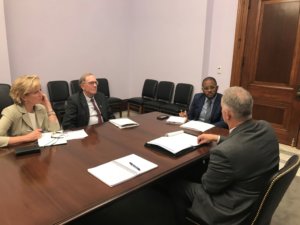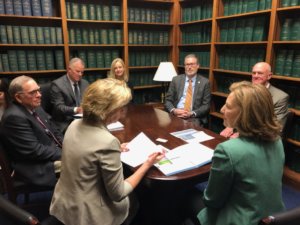18 Jun VOICES OF THE PROJECT HEARD IN NATION’S CAPITAL
By: Vicky Scharlau | Executive Director, CBDL
The need to push Columbia Basin Project completion forward takes many paths. One regular path is from this Washington to the other one. Policymakers in both Washington’s are key to significant movement in terms of rule change, law change and funding.
Last month the League gathered multiple “voices” together and traveled to Washington DC setting meetings with regulators and with Congressional offices. Those traveling included: Mark Stedman, League Chair and Lincoln County Commissioner; Matt Harris, Director of Governmental Affairs for the Potato Commission; Tom Tebb, Director of Ecology’s Office of Columbia River; Mike Schwisow, League Director of Government Affairs; Vicky Scharlau, League Executive Director; and Orman Johnson, League Trustee and Director of the East Columbia Basin Irrigation District. The group was joined one day by Representative Mary Dye (R-Pomeroy) of the 9th District which includes municipalities with failing wells and farmers with wells that, if they work at all, draw water that has become so poor and so warm as to render it nearly unusable.
The messages were clear and consistent and started with explaining who the League was and why the group was unique and important. The “voices” of this lobby team shared that the group represented the Columbia Basin Development League which has supported the Bureau of Reclamation’s Columbia Basin Project (CBP) since 1964 when the organization was formed. The lobby team shared that the League is made up of farmers, businesses, civic and economic groups, and individuals that recognize the importance of completing the CBP. The team made the point in each meeting to share that the CBP is a multi-purpose, federally authorized water reclamation project with benefits to local, state, and national economies by generating over $5.81 billion in annual, cumulative economic activity.
Most surprising to many of the newer staff comes when the “other benefits” are highlighted. Those including hallmark power generation, irrigated agriculture, recreation drawing over three million visitors to fish, hunt, camp, and swim each year, along with biodiverse wetlands that form part of the Columbia National Wildlife Refuge, and flood control, municipal and industrial water uses.
Specific messages were shared, and specific action was requested. The team urged Congress to prioritize water infrastructure in any infrastructure or transportation package considered during the 116th Congress. Specifically, the lobby team asked that the:
- Amendment be signed to renew the Master Water Service Contract to ensure project water delivery to 70,000 acres
- Odessa Groundwater Replacement Program receive a $10 million designated line item in the Bureau of Reclamation’s Columbia Basin Project account within the President’s FY2021 budget
- Columbia Basin Project infrastructure be funded for facility operations, maintenance and rehabilitation in the Bureau of Reclamation’s Columbia Basin Project account in FY2021 Energy and Water Appropriations
- WaterSMART grants in the Bureau of Reclamation’s Water and Related Resources account of the FY2021 Energy and Water Appropriations be funded
- Project completion be addressed with the inclusion of robust funding in the Bureau of Reclamation’s Columbia Basin Project account in the FY2021 Energy and Water Appropriations
- $1.75 billion be authorized for Department of Agriculture’s EQIP program in the FY2020 Agriculture, Rural Development, Food and Drug Administration, and Related Agencies Appropriations
- $1 billion in funding for BUILD Grants as proposed in the President’s budget proposal be supported in the FY2020 Transportation, Housing and Urban Development, and Related Agencies Appropriations
Even though the League has traveled to DC at least and often two or more times a year and has a federal lobby team, many Congressional offices included new faces: both staff and the elected representative. While a challenge, new faces present an opportunity to share important messaging about the CBP – the most impressive being that it is the largest U.S. Bureau of Reclamation Project.
The lobby team had the opportunity to share the main problem: that the CBP is not fully developed. That development was intended to occur in phases, and the current phase focuses on addressing the immediate crisis of the Odessa Aquifer depletion by transferring up to 87,700 acres irrigated by deep wells to CBP surface water. The team pointed out that the emergency nature of this undertaking is not a “normal” phase of development, but it is critical to preventing an economic and environmental crisis. Documents from the Washington State Potato Commission estimated that failure to address the aquifer depletion will result in the loss of 3,600 jobs and $840 million annually in agricultural production in the Odessa Subarea alone.
The team also shared that infrastructure is aging and in need of replacement and repair. The team reminded policymakers that Congress approved the CBP in 1933 and has a rich history, legacy, and story with some infrastructure more than 70 years old.


